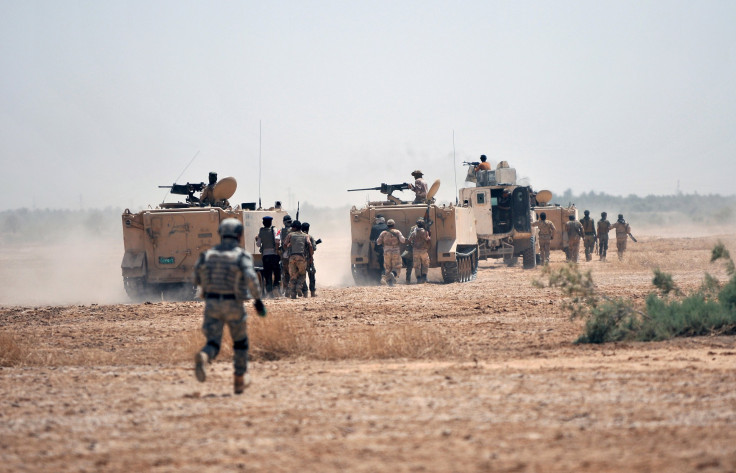ISIS Attack: More Than 80 People Killed In Eid Al-Fitr Bombing In Khan Bani Saad, Iraq

The Islamic State group claimed responsibility for a massive car bomb attack in Khan Bani Saad, Iraq. The attack has killed 80 people, including children, but officials told Reuters that they are still counting the bodies. Some local news outlets reported that as many as 180 people have been killed.
"We have 35 martyrs and more than 70 wounded," said Mohammed Jawad al-Hamadani, a council member in Diyala province, where Khan Bani Saad is located, the AFP news agency reported.
The force of the blast in Khan Bani Saad, about 20 miles northeast of Baghdad, brought down several buildings, crushing people who were celebrating Eid al-Fitr, the end of the Muslim fasting month of Ramadan.
#Iraq car bomb blast kills at least 80: Children among dead after explosion at busy market in Khan Bani Saad n... http://t.co/tKBTXsHjw5
— Updated News (@News_LNK) July 17, 2015Videos of the aftermath of the bombing shared on social media show burning cars amd men searching for bodies underneath the rubble of fallen buildings.
"Some people were using vegetable boxes to collect children's body parts," said police Maj. Ahmed al-Tamimi from the site of the explosion, Reuters reported.
Khan Bani Saad is located in Diyala, a province that has witnessed intense battles between Iraqi Security Forces and militants from the Islamic State group, also known as ISIS or ISIL. Diyala is known as a breeding ground, and a massive training hub, for ISIS fighters.
The bombing in Khan Bani Saad comes at a time when Iraqi Security Forces are waging a massive offensive against the Sunni militant group in Iraq's western Anbar province in the cities of Ramadi and Fallujah.
Shiite volunteer groups, along with security forces in the national police, began attacking ISIS in Fallujah, which borders Baghdad, earlier this month. ISIS has controlled large swaths of land in Fallujah for several months, but recently made a push to take over complete control of the city, which lies less than 50 miles from the capital.
So far, the Iraqi forces have managed to take back several smaller villages outside Fallujah, and are slowly moving toward the center of the city with the help of air cover from the Iraqi air force and the U.S.-led coalition.
If ISIS succeeded in capturing all of Fallujah, it would put Baghdad squarely in its crosshairs. Anticipating the Sunni militant group's advance, Shiite volunteer forces, also known as the Popular Mobilization Committee, launched an offensive in the area at the end of June.
The U.S. coalition has been dropping bombs on Fallujah and its surrounding area for months, fighters said, but the attacks have not succeeded in eliminating ISIS' presence because many of the Sunni sheikhs in the area are supporting the militant group with cash and weapons. Some have even pledged allegiance to the group.
The Sunni militant group is preventing residents from leaving the city of Falluhjah and Iraqi officials say they fear the extremists will commit crimes that amount to genocide.
“IS has been using civilians as human shields in Fallujah for more than three months, preventing them from leaving the city and confiscating the property of anyone who disobeys,” Iraq’s High Commissioner for Human Rights Fadel al-Gharawi said in a statement Tuesday. "Insurgents have planted improvised explosive devices in all of the city’s mosques and residential buildings and along the roads that lead to Fallujah."
Meanwhile, the battle for Ramadi is putting the new U.S.-Iraqi military strategy to test. Over the past two months U.S. military advisors in the country have formulated a plan to take back the city from ISIS militants, who took it over in May, by training new elite Sunni tribal forces that could infiltrate the area and gain confidence from locals.
The tensions between the Shiite and Sunni fighters forced the U.S. military advisors in the country to rethink its strategy in Anbar, an area that consists predominantly of Sunnis, in the wake of the Ramadi defeat. The Baghdad government and its American allies decided that it needed a new force, allied with the wealthy Sunni tribesmen that govern Anbar and provided the fighters with the heavy weapons needed to take on the disciplined, well-armed ISIS fighters. It began training Sunni volunteers in May at the Habbaniyah military base on the outskirts of Ramadi who would also be paid a salary of $800 a month.
But fighters have told International Business Times that despite the changes in military strategy and new American weapons, the offensive could still fail to defeat the Sunni militant group because of widespread disagreements between Shiite and Sunni fighters.
© Copyright IBTimes 2024. All rights reserved.





















